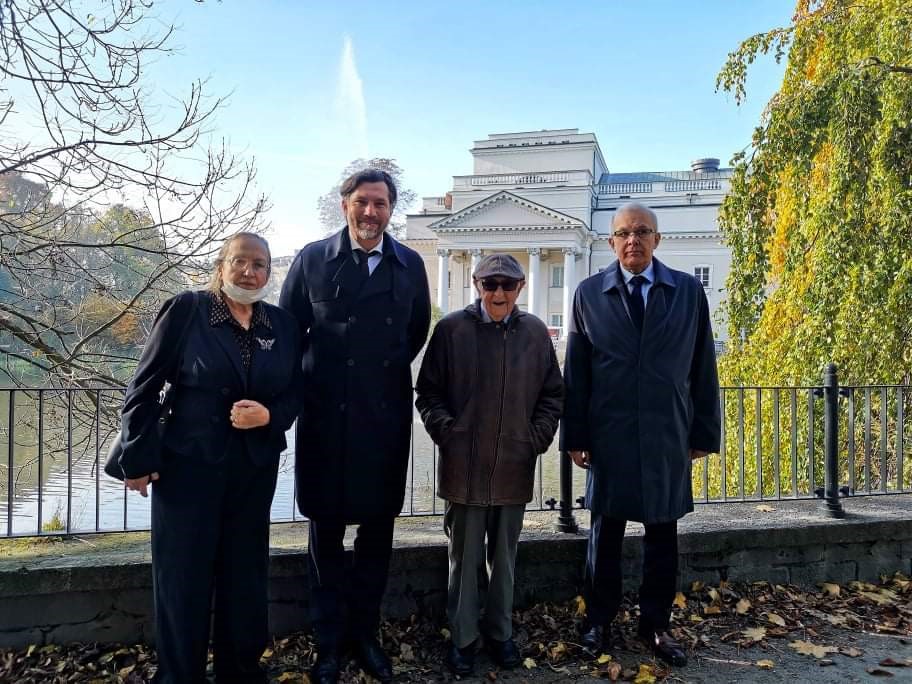
2021, t. 4, nr. 2 (8), poz. 34
2021, Vol. 4, No. 2 (8), item. 34
Awarding the title of doctor honoris causa of the Calisia University, Kalisz, Poland to Professor Theodor Meron
On 24.10.2021, in the W. Boguslawski Theater, the inauguration of the II World Conference on Family Health ”Health at the time of crises and wars” and Calisia University Kalisz, Senate Celebratory Meeting, the ceremony of awarding the title of doctor honoris causa of the Calisia University, Kalisz, Poland to Professor Theodor Meron took place.
Professor Theodor Meron was awarded the first honorary doctorate of the Kalisz University by the Rector Prof. Dr Andrzej Wojtyła and presented the professor with the title of Honorary Citizen of Kalisz by the City President, Krystian Kinastowski and the President of the Kalisz City Council Tadeusz Skarżyński.
In the laudatory speech in his honour by the promoter, the Rector Prof. dr Andrzej Wojtyla said, that: "We are proud that such an eminent judge, a world-renowned scholar, and at the same time a man of impeccable life attitude and decency, involved in public affairs, wished to accept the first title of the Kalisz Academy". He also added that Professor Theodor Meron's great passion is his love for the works of William Shakespeare. "In his public and scholarly activities, he remained faithful to Shakespeare's maxim that moral duty and conscience should guide the conduct of both leaders and citizens", Speeches of the reviewers, Professor Patrycja Grzebyk and Professor Bogusław Sygit followed.
Professor Theodor Meron was born on 28 April 1930 in Kalisz, where he spent his childhood. He was 9 years old when Nazi Germany invaded Poland. After the outbreak of World War II he was in the ghetto in Częstochowa, and then in a forced labor camp. In 1945, he emigrated to Palestine and then to the United States. The judge Theodor Meron is considered one of the world-famous expert in humanitarian and criminal law and human rights. He received his legal education at the Hebrew University (M.J.), Harvard Law School (LL.M., J.S.D.) and Cambridge University (Diploma in Public International Law). He immigrated to the United States in 1978 and he is a citizen of the United States.He served as a judge of the International Criminal Tribunal for the former Yugoslavia (ICTY), International Criminal Tribunal for Rwanda (ICTR), and the International Residual Mechanism for Criminal Tribunals (Mechanism). He served as President of the ICTY four times (2002-2005 and 2011-15) and inaugural President of the Mechanism for three terms (2012-19).
In his speech he said that his childhood in pre-war Kalisz was happy. "I remember playing hide and seek in my grandfather's sawmill, kayaking in the summer and skating on the Prozna River in the winter. We listened to Chopin's music and went to school. From those nine years I do not remember any suffering or manifestations of anti-Semitism." He also added that to this day he hums the folk song "Krakowiaczek jeden" and the Military Polonaise.
He underlined that: "Terror and suffering is what I and my family experienced during World War II in Poland. It had an overwhelming impact on the decisions I made later in my career. It determined my specialization in international criminal law and human rights".
During the gala, Professor Meron confessed that after his liberation from the labor camp in Czestochowa and for years to come, he had nightmarish dreams during which he escaped from Germans dressed in black uniforms. "They chased me and couldn't catch me, but they constantly pursued me until I woke up covered in sweat. I tried to forget about it, I couldn't even think about going back to the places that had left such a painful mark on me. I did not expect that I would ever see Poland again and I would never have had the courage to return here if it had not been for the fact that I was invited by the Polish Red Cross committee in 1986 to speak about international humanitarian law at a summer course at Warsaw University”.
He also stated: "I decided to face this past and together with my wife, who is French, I came to Kalisz, Treblinka, Czestochowa - places so closely connected with the war. It was a very painful journey for me. I would never have believed that a direct confrontation with the traumatic past could free me from the demons of the past. Returning to my childhood places freed me from the nightmares and ghosts of my past. Those nightmarish dreams stopped coming back to me".
Judge Meron also stressed, that the wounding and murdering of children is "one of the worst aspects of Nazi evil, because even the worst barbarians in the cruelest episodes of human history protected children from massacres and crimes committed against humanity." He recalled that 1.5 million children, mostly of Jewish origin, were murdered by the Nazis during the Holocaust years. He also said: "I weep over the fate of the Jewish and Polish martyrs of Kalisz. 30,000 Jews and 20,000 Catholics from Kalisz were either murdered or expelled so that German colonists could settle in the Kalisz area without hindrance".
Among famous scholars from different countries, the gala was attended also by the Minister of Family and Social Policy Marlena Maląg and Government Plenipotentiary for Polonia and Poles Abroad Jan Dziedziczak.
Before the event, at 3pm the Ecumenical Service at the Shrine of Saint Joseph in Kalisz was held, followed by laying flowers at the monument commemorating Saint John Paul II.

Walk in the parc, first from right, Rector A. Wojtyła, Prof. T. Meron, President of Kalisz Krystian Kinastowski. Dr E. Sałkiewicz-Munnerlyn
The next day, on 25th October 2021, Plenary sessions took place with the main subject: THE DEVELOPMENT OF HEALTH SITUATION IN POLAND, WITH A FOCUS ON THE PERIOD BETWEEN 1990 AND 2020, presided by Session Chairpersons: Prof. dr Andrzej Wojtyła and Prof. dr Witold Zatoński. After the introduction by Andrzej Wojtyła, Jurgen Rehm, Aurelijus Veryga, Jarosław Neneman, Witold Zatoński, the introductory lecture: Health and sustainable development during the pandemic (European report) was presented via video by Prof. Martin McKee. Later the session 1 A entited FAMILY HEALTHCARE IN POLAND, ISRAEL, MOZAMBIQUE, AND UKRAINE took place with the Session Chairperson: Professor Leonardo Chavane. We listened to differents lectures of: 1. Family Healthcare in Poland - Zofia Małas, the director of the Main Council of Nurses and Midwives. 2. Family Healthcare in Israel- Liat Safri, Western Galilee Medical Center, Israel, 3. Family Healthcare in Israel - Ruth Bitton, Head of the Midwifery Education, Northern Region, Israel. 4.Family Healthcare in Mozambique – PhD Leonardo Chavane, Eduardo Mondlane University, Mozambique, 5. The birth and the development of the family healthcare in Ukraine - Professor Andriej Bazylewicz, the president of the World Ukrainian Federations.
Parallel was a session B, on the Development of health situation in Central European countries with the Session Chairperson: Mindaugas Stelemekas, where the following subjects were discussed: Epidemiology of alcohol related diseases and attempts to minimize alcohol consumption consequences in Italy, Carlo La Vecchia, Health Crisis of 2020 – Lithuania example - Justina Vaitkeviciute, Review of the inequalities in the health accessibility in Latvia on the basis of gender – Inese Gobina.
In the afternoon the session 2 took place under the Session Chairperson: PhD Przemysław Biliński, Calisia University - Kalisz, Poland. The following lectures were presented: The Spanish Family Law under Covid-19- PhD Luis Javier Capote Perez, Tenerife, Spain (20’)- (remote entrance) ,Vaccination – the basis to limit the COVID-19 pandemic – PhD Andrzej Trybusz, Calisia University - Kalisz, Poland , Professor Jan Chodkiewicz. At the same time the parallel session 2 took place with the title: Smoking and epidemiology of tobacco-related diseases, under the Session Chariman Tomasz Zdrojewski and Mateusz Zatoński. The lectures were: Nicotine consumption and lung cancer in Poland – Professor Witold Zatoński, Tobacco consumption and tobacco-related sicknesses in Lithuania - (Vaida Liutkute-Gumarov), Smoking and tobacco-related diseases trends on Latvia - Iveta Pudule Inequalities in health accessibility – Kinga Janik-Koncewicz and team.
From 16.00 to 18.00 session 3 took place with the title of: HUMAN RIGHTS IN ARMED CONFLICTS, under the Session Chairperson: PhD Ewa Sałkiewicz-Munnerlyn, Calisia University - Kalisz, Poland, with the following lectures: 1. Building a Just World Order - Professor Alfred de Zayas, Geneva School of Diplomacy. 2. The psycho-social impact of the global pandemic in the families of genocide survivors- Assumpta Mugiraneza, the Director of the Iriba Centre for Multimedia Heritage, IRIBA, Kigali, Rwanda. 3. Human rights in times of armed conflicts-- PhD Ewa Salkiewicz-Munnerlyn, Poland, 4. Family during the time of crisis in Albania – Father Wojciech Żmudziński, SJ, Collegium Bobolanum, Poland. The discussion followed between participants: Professor Marderos Sayegh, PhD, Eng. Wrocław University of Science and Technology and Professor Zbigniew Krysiak, Institute of Schuman Thought, Warsaw.
In parallel session3 took place, with the title: ALCOHOL CONSUMPTION AND EPIDEMIOLOGY OF ALCOHOL-RELATED DISEASES, under the Session Chairperson: Jurgen Rehm, Kinga Janik-Koncewicz with the following lectures: 1. History of alcohol consumption and epidemiology of alcohol related diseases in Poland - Professor Witold Zatoński and team, 2. Review of the polish legislation within the scope of the limiting of the alcohol consumption – Mateusz Zatoński, 3. Polish alcohol excise tax – Jarosław Neneman, 4. Alcohol consumption and epidemiology of alcohol-related disease in Lithuania - Mindaugas Stelemekas. 5. Alcohol consumption and epidemiology of alcohol-related disease in Latvia – Laura Isajeva. By the end, the summary of the discussion by the Session Charipersons: Andrzej Wojtyła and Witold Zatoński





